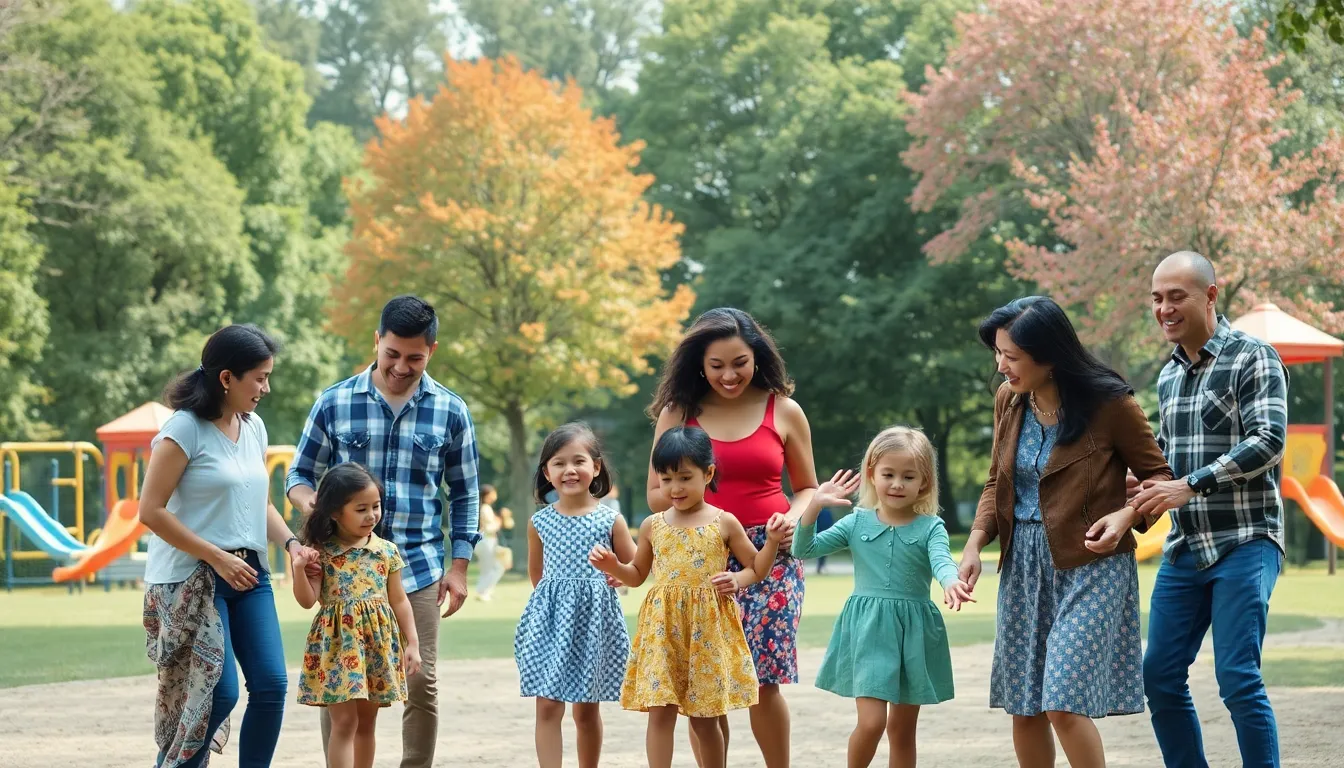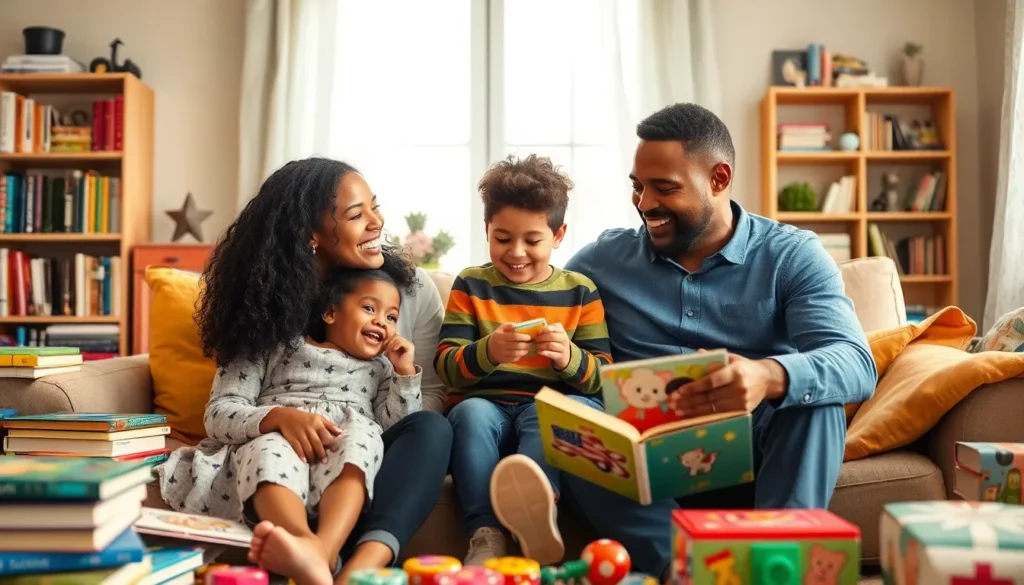Table of Contents
ToggleIn a world bursting with colors, cultures, and quirks, parenting isn’t just a one-size-fits-all adventure. Diverse parenting embraces the beautiful chaos of different backgrounds, beliefs, and traditions. It’s like mixing the perfect cocktail—each ingredient adds its own flavor, making the experience richer and, let’s face it, a lot more fun.
Understanding Diverse Parenting
Diverse parenting reflects the rich tapestry of human experiences, blending various cultural backgrounds and beliefs. This variety enhances family life and child development, creating well-rounded individuals.
Definition of Diverse Parenting
Diverse parenting refers to the unique approaches different families take based on their individual histories and cultures. It encompasses various parenting styles influenced by factors like ethnicity, religion, and socioeconomic status. Each family’s experience shapes their children’s values and behaviors, reinforcing the notion that there’s no single right way to raise a child. Exposure to diverse parenting methods fosters adaptability in children, preparing them for an increasingly multicultural world.
Importance of Diversity in Parenting
Diversity in parenting proves crucial for several reasons. Children raised in diverse environments often develop greater empathy and understanding towards others. Exposure to different traditions and customs enriches their lives and broadens their perspectives. Additionally, diversity enhances problem-solving skills by teaching children to consider various viewpoints. Embracing diversity within families contributes to more inclusive societies, encouraging acceptance and coexistence among individuals of differing backgrounds.
Types of Diverse Parenting

Diverse parenting takes many forms, reflecting the richness of human experience. The following types illustrate how varied approaches contribute to a child’s upbringing.
Cultural Perspectives
Cultural perspectives significantly shape parenting styles. In many cultures, communal parenting is common, where extended family members share responsibilities. Methods emphasize respect for elders and traditions. Practices vary widely; for instance, collectivist cultures often prioritize group harmony, whereas individualistic cultures focus on personal achievement. Families benefit from integrating their cultural values into daily life. Sharing unique customs fosters understanding of identity and belonging in children.
Non-Traditional Family Structures
Non-traditional family structures enrich the landscape of diverse parenting. Same-sex couples, single parents, and blended families exemplify this diversity. Each structure offers distinct experiences and parenting strategies. For instance, single parents often develop strong independence in their children. Blended families promote adaptability and collaboration among siblings. Diverse family dynamics teach children to appreciate different forms of love and support. These structures validate that effective parenting transcends conventional frameworks.
Challenges of Diverse Parenting
Diverse parenting presents unique challenges that families often face. These challenges arise from societal pressures and the complexities of navigating identity.
Societal Pressures and Stereotypes
Families experience societal pressures that can influence parenting styles. Stereotypes often dictate how parents should behave based on their backgrounds or structures. Traditional views may marginalize non-traditional families, like same-sex couples or single parents. This marginalization can create feelings of inadequacy among parents striving to conform to societal expectations. Parents often feel scrutinized for their choices, making confidence in their methods vital. Overcoming these pressures requires strong support systems and self-acceptance. Understanding that diverse parenting enriches children’s lives can help families resist detrimental stereotypes.
Navigating Identity and Belonging
Diverse parenting involves navigating complex identities. Children often grapple with their cultural heritage and societal identity. Balancing different cultural expectations can create tensions within families. Parents play a crucial role in guiding children through these experiences, fostering a sense of belonging. Providing open discussions about identity helps children appreciate their background. Encouraging participation in cultural traditions strengthens familial bonds. These actions cultivate resilience in children, helping them embrace their uniqueness. Acknowledging the richness of varied identity fosters a supportive environment where all members thrive.
Benefits of Diverse Parenting
Diverse parenting offers numerous advantages for families and children. These benefits contribute significantly to child development and community engagement.
Unique Learning Opportunities
Unique experiences wait for children raised in diverse households. Exposure to various cultures and traditions broadens understanding and encourages curiosity. Children learn about different customs, foods, and languages, fostering an inclusive mindset. They develop skills in empathy and adaptability, which are essential in today’s interconnected society. Engaging in diverse learning environments enriches problem-solving abilities. The ability to approach issues from multiple perspectives creates well-rounded individuals who appreciate diversity.
Strengthening Community Ties
Strengthened community bonds stem from diverse parenting. Families with varied backgrounds often form connections through shared experiences and values. Participating in diverse cultural events allows families to collaborate, support one another, and celebrate differences. Active involvement in the community fosters relationships that transcend cultural boundaries. Children in these environments learn the importance of acceptance and inclusion. An interconnected community embracing diversity cultivates a sense of belonging, enhancing overall well-being for families. This integration of diverse perspectives strengthens the fabric of society.
Diverse parenting enriches the family experience and shapes well-rounded individuals. By embracing various cultural backgrounds and beliefs, families cultivate environments that promote empathy and understanding. This diversity not only enhances children’s adaptability but also prepares them for a multicultural world.
Navigating the complexities of diverse parenting can be challenging, yet it offers invaluable lessons in acceptance and resilience. As families share their unique experiences and support one another, they contribute to stronger communities. Ultimately, diverse parenting is a powerful testament to the beauty of human connection, fostering a sense of belonging for both parents and children alike.







